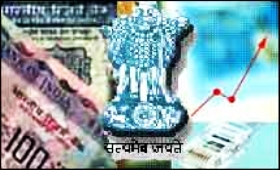|

|
'Economic growth must relate to socio-economic justice'
|
|

|
|
| Top Stories |
 |
|
|
|
SME Times News Bureau | 10 Apr, 2017
Chief Justice of India Jagdish Singh Khehar on Saturday came down heavily on political parties across the spectrum for their failure to link economic growth with socio-economic justice for the weaker sections of the society.
According to Justice Khekar, although political parties talk about economic reforms and globalisation in their manifestos, they never link the achievements of economic growth with the constitutional goal of socio-economic justice for the SCs, STs and other weaker sections of society.
Justice Khehar expressed his views while speaking at the inauguration of the two-day all India seminar on "Economic Recovery with Reference to Electoral Issues", organised here by the Confederation of Indian Bar.
Pointing out that the manifestos of different parties were "remarkably" similar, Khehar said the problem was with their implementation where the generation of wealth remained compartmentalised.
He said there was no link of the economic growth with the goal of socio-economic justice as spelt out in the Directive Principles of State Policy in the Constitution.
It was always easy to speak of constitutional values and all the more easy to speak in abstract, Khehar said.
He said the question is: "How to operate the economic system for the good of the people through constitutional means?"
Chief Justice also felt that economic growth has to be coupled with economic justice and economic harmony.
In a poser, he asked what was the purpose of generating wealth and said that the concentration of wealth and means of generating it should not be detrimental to the common interests.
Calling for the accountability of elected representatives, President Pranab Mukherjee in his address said that all political parties would have to develop a voluntary code of conduct for their working.
He said that except for the two general elections of 1957 and 1984, in no other election had any party in the Lok Sabha secured 50-plus percentage of votes. "Even in 1984, the Congress under late Prime Minister Rajiv Gandhi got only 48.6 per cent of votes."
Mukherjee said the difficulty was that those getting less than 50 per cent votes and not in power had "every thing but no accountability".
Stating that a strong electoral system was necessary to strengthen the democratic structure of India, the President said that timely reforms were necessary which not only would give justice to the people but also to the ideals enshrined in the Constitution.
He urged the gathering for a dispassionate analysis of the way in which our electoral process is functioning with a view to address the shortcomings in the system.
Calling for a healthy debate, the President said that Parliament was not just a deliberating body but also a decision making body.
Addressing the inaugural session, Justice Dipak Misra said that the free and fair elections were imperative for the democracy, and for the purity and credibility of elections, it should be clear that purchasing power had no room in the electoral process.
Justice Misra said that for democracy to survive, the rule of law must be there and the candidates contesting election must bear in mind that contesting election was not an investment and they would have to nurture and serve their constituency.
Emphasising on the moral conduct, Justice Misra said people must remember the phrase "out of debt, out of danger".
Senior counsel Harish Salve, who is a founder member of the Confederation of Indian Bar, said: "If we can reduce the cost of election, we can proceed on cleansing of the funding of elections."
CIB President Pravin H. Parekh delivered the welcome address and its Vice President Ravindra Shrivastava gave the vote of thanks.
|
|
|
| |
|
|
|
|
|
|
|
|
|
|
|
|
|
|
| |
| Customs Exchange Rates |
| Currency |
Import |
Export |
US Dollar
|
66.20
|
64.50 |
UK Pound
|
87.50
|
84.65 |
Euro
|
78.25
|
75.65 |
| Japanese
Yen |
58.85 |
56.85 |
| As on 13 Aug, 2022 |
|
|
| Daily Poll |
 |
 |
| PM Modi's recent US visit to redefine India-US bilateral relations |
|
|
|
|
|
| Commented Stories |
 |
|
|
|
|
|
| |
|